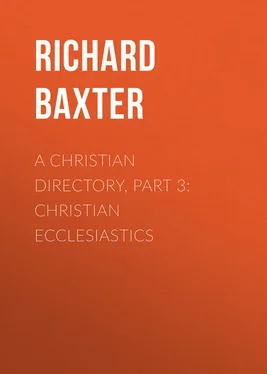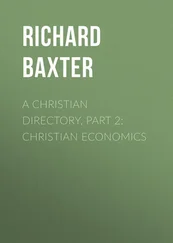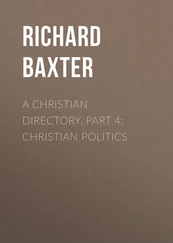Richard Baxter - A Christian Directory, Part 3 - Christian Ecclesiastics
Здесь есть возможность читать онлайн «Richard Baxter - A Christian Directory, Part 3 - Christian Ecclesiastics» — ознакомительный отрывок электронной книги совершенно бесплатно, а после прочтения отрывка купить полную версию. В некоторых случаях можно слушать аудио, скачать через торрент в формате fb2 и присутствует краткое содержание. Жанр: foreign_antique, foreign_prose, на английском языке. Описание произведения, (предисловие) а так же отзывы посетителей доступны на портале библиотеки ЛибКат.
- Название:A Christian Directory, Part 3: Christian Ecclesiastics
- Автор:
- Жанр:
- Год:неизвестен
- ISBN:нет данных
- Рейтинг книги:3 / 5. Голосов: 1
-
Избранное:Добавить в избранное
- Отзывы:
-
Ваша оценка:
- 60
- 1
- 2
- 3
- 4
- 5
A Christian Directory, Part 3: Christian Ecclesiastics: краткое содержание, описание и аннотация
Предлагаем к чтению аннотацию, описание, краткое содержание или предисловие (зависит от того, что написал сам автор книги «A Christian Directory, Part 3: Christian Ecclesiastics»). Если вы не нашли необходимую информацию о книге — напишите в комментариях, мы постараемся отыскать её.
A Christian Directory, Part 3: Christian Ecclesiastics — читать онлайн ознакомительный отрывок
Ниже представлен текст книги, разбитый по страницам. Система сохранения места последней прочитанной страницы, позволяет с удобством читать онлайн бесплатно книгу «A Christian Directory, Part 3: Christian Ecclesiastics», без необходимости каждый раз заново искать на чём Вы остановились. Поставьте закладку, и сможете в любой момент перейти на страницу, на которой закончили чтение.
Интервал:
Закладка:
Direct. X. Be sure when you first enter upon an inquiry or dispute, that you well discover how much of the controversy is verbal de nomine , and how much is material de re ; 131 131 Non ex verbis res, sed ex rebus verba esse inquirenda, ait Myson. in Laert. p. 70. Bas. 1 Edit.
and that you suffer not your adversary to go on upon a false supposition, that the controversy is de re , when it is but de nomine . The difference between names and things is so wide, that you would think no reasonable man should confound them: and yet so heedless in this point are ordinary disputers, that it is a usual thing to make a great deal of stir about a controversy before they discern whether it be de nomine or de re . Many a hot and long dispute I have heard, which was managed as about the very heart of some material cause, (as about man's power to do good, or about the sufficiency of grace, or about justification, &c.) when the whole contest between the disputers was only or principally de nomine , and neither of them seemed to take notice of it. Be sure as soon as you peruse the terms of your question, to sift this thoroughly, and dispute verbal controversies but as verbal, and not as real and material. We have real differences enow: we need not make them seem more by such a blind or heedless manner of disputing. 132 132 It is a noble work that Mr. Le Blanck of Sedan is about to this purpose, stating more exactly than hath yet been done all the controversies between us and the papists: which how excellently he is like to perform I easily conjecture by the Disputes of his upon Justification, &c. which I have seen.
Direct. XI. Suffer not a rambling mind in study, nor a rambling talker in disputes, to interrupt your orderly procedure, and divert you from your argument before you bring it to the natural issue. But deceiving sophisters, and giddy-headed praters, will be violent to start another game, and spoil the chase of the point before you: but hold them to it, or take them to be unworthy to be disputed with, and let them go (except it be where the weakness of the auditors requireth you to follow them in their wild-goose chace). You do but lose time in such rambling studies or disputes.
Direct. XII. Be cautelous of admitting false suppositions; or at least of admitting any inference that dependeth upon them. In some cases a supposition of that which is false may be made, while it no way tends to infer the truth of it; but nothing must be built upon that falsehood, as intimating it to be a truth. False suppositions cunningly and secretly worked into arguments, are very ordinary instruments of deceit.
Direct. XIII. Plead not uncertainties against certainties: but make certain points the measure to try the uncertain by. Reduce not things proved and sure to those that are doubtful and justly controverted; but reduce points disputable to those that are past doubt.
Direct. XIV. Plead not the darker texts of Scripture against those that are more plain and clear, nor a few texts against many that are as plain; for that which is interpreted against the most plain and frequent expressions of the same Scripture is certainly misinterpreted.
Direct. XV. Take not obscure prophecies for precepts. The obscurity is enough to make you cautelous how you venture yourself in the practice of that which you understand not: but if there were no obscurity, yet prophecies are no warrant to you to fulfil them; no, though they be for the church's good. Predictions tell you but de eventu what will come to pass, but warrant not you to bring it to pass. God's prophecies are ofttimes fulfilled by the wickedest men and the wickedest means: as by the Jews in killing Christ, and Pharaoh in refusing to let Israel go, and Jehu in punishing the house of Ahab. Yet many self-conceited persons think that they can fetch that out of the revelations or the prophecies of Daniel, that will justify very horrid crimes, while they use wicked means to fulfil God's prophecies.
Direct. XVI. Be very cautelous in what cases you take men's practice or example to be instead of precept, in the sacred Scriptures. In one case a practice or example is obligatory to us as a precept; and that is, when God doth give men a commission to establish the form or orders of his church and worship, (as he did to Moses and to the apostles,) and promiseth them his Spirit to lead them into all truth, in the matters which he employeth them in: here God is engaged to keep them from miscarrying; for if they should, his work would be ill done, his church would be ill constituted and framed, and his servants unavoidably deceived. The apostles were authorized to constitute church officers and orders for continuance; and the Scripture, which is written for a great part historically, acquaints us what they did (as well as what they said and wrote) in the building of the church, in obedience to their commission (at least in declaring to the world what Christ had first appointed). And thus if their practice were not obligatory to us, their words also might be avoided by the same pretences. And on this ground (at least) the Lord's day is easily proved to be of divine appointment and obligation. Only we must see that we carefully distinguish between both the words and practice of the apostles which were upon a particular and temporary occasion (and obligation) from those that were upon a universal or permanent ground.
Direct. XVII. Be very cautelous what conclusions you raise from any mere works of Providence. For the bold and blind exposition of these, hath led abundance into most heinous sins: no providence is instead of a law to us; but sometimes and ofttimes Providence changeth the matter of our duty, and so occasioneth the change of our obligations (as when the husband dieth, the wife is disobliged, &c.) But men of worldly dispositions do so over-value worldly things, that from them they venture to take the measure of God's love and hatred, and of the causes which he approveth or disapproveth in the world. And the wisdom of God doth seem on purpose, to cause such wonderful, unexpected mutations in the affairs of men, as shall shame the principles or spirits of these men, and manifest their giddiness and mutability to their confusion. One year they say, This is sure the cause of God, or else he would never own it as he doth; another year they say, If this had been God's cause he would never have so disowned it: just as the barbarians judged of Paul when the viper seized on his hand. And thus God is judged by them to own or disown by his prospering or afflicting, more than by his word.
Direct. XVIII. In controversies which much depend on the sincerity or experience of godly men, take heed that you affect not singularity, and depart not from the common sense of the godly. For the workings of God's Spirit are better judged of by the ordinary tenor of them, than by some (real or supposed) case that is extraordinary.
Direct. XIX. In controversies which most depend on the testimony of antiquity, depart not from the judgment of the ancients. They that stood within view of the days of the apostles could better tell what they did, and what a condition they left the churches in, than we can do. To appeal to the ancients in every cause, even in those where the later christians do excel them, is but to be fools in reverence of our forefathers' wisdom. But in points of history, or any thing in which they had the advantage of their posterity, their testimony is to be preferred.
Direct. XX. In controversies which depend on the experience of particular christians or of the church, regard most the judgment of the most experienced, and prefer the judgment of the later ages of the church before the judgment of less experienced ages (except the apostolical age, that had the greater help of the Spirit). An ancient, experienced christian or divine is more to be regarded in many points, which require experience, than many of the younger sort, that are yet more zealous and of quicker understanding and expression than the elder. So those that we call the fathers or ancients were indeed in the younger ages of the church, and we that are fallen into the later and more experienced age, have all the helps of the wisdom and experience of the ages that were before us: and therefore God will require at our hands an account of these greater talents which we have received! As it were unexcusable now in a physician that hath the help of such voluminous institutions, observations, and experiments of former ages, to know no more than those former times that had no such helps; so would it be as unexcusable for this present age of the church to be no wiser than those former ages. When Aquinas, Scotus, Ariminensis, and other schoolmen, delivered the doctrine of christianity to the church in a dress so far different from Ignatius, Irenæus, Tertullian, Cyprian, or any of those former ages, they certainly thought that they had attained to a far greater excellency and accurateness in the knowledge of divinity than those their ancestors had attained: and whatever they swear in the Trent oath, of not expounding any Scripture otherwise than the fathers do, I doubt not but Suarez, and Vasquez, and others of their modern schoolmen, thought so too, and would have been loth to be accounted wise in the measure only of those ancients. 133 133 Satis triumphat veritas si apud paucos bonosque accepta: nec indoles ejus est placere multis. Lipsius.
The later and elder ages of the church have had abundant experience, e. g. of the tendency of ambition and papal aspirings and usurpations; of the mischiefs of composing and imposing the popish missals and numerous ceremonies, and of their implicit faith, and their concealment of the Scriptures from the vulgar, and many such points; and if we are never the wiser for all this experience, we are the more unexcusable; and may be judged as the neglecters of our greater helps.
Интервал:
Закладка:
Похожие книги на «A Christian Directory, Part 3: Christian Ecclesiastics»
Представляем Вашему вниманию похожие книги на «A Christian Directory, Part 3: Christian Ecclesiastics» списком для выбора. Мы отобрали схожую по названию и смыслу литературу в надежде предоставить читателям больше вариантов отыскать новые, интересные, ещё непрочитанные произведения.
Обсуждение, отзывы о книге «A Christian Directory, Part 3: Christian Ecclesiastics» и просто собственные мнения читателей. Оставьте ваши комментарии, напишите, что Вы думаете о произведении, его смысле или главных героях. Укажите что конкретно понравилось, а что нет, и почему Вы так считаете.












